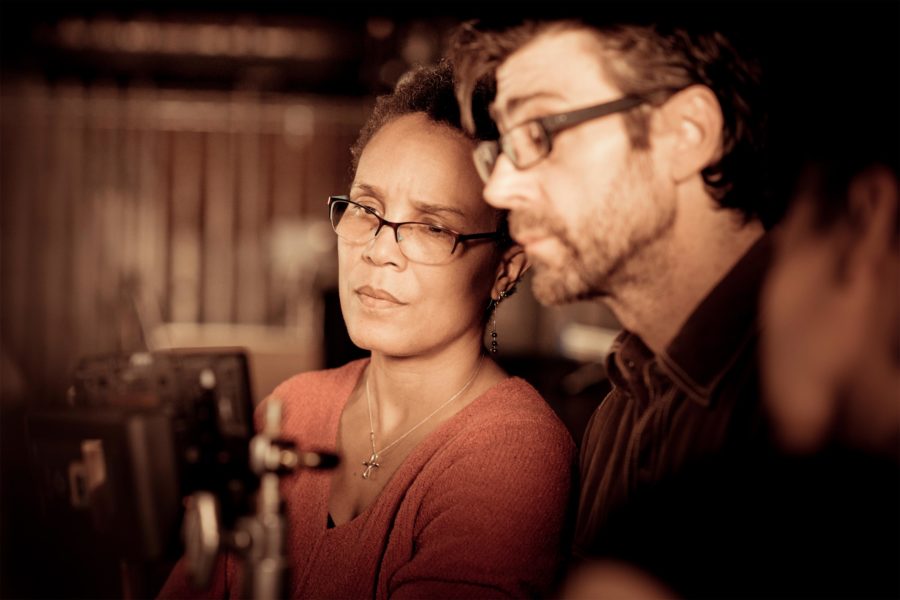Pennsylvania native and Boston filmmaker Tracy Heather Strain has idolized Lorraine Hansberry since she was 17.
Strain’s introduction to Hansberry was through “To Be Young, Gifted and Black,” a play based on the late writer, civil rights activist, feminist and humanitarian’s autobiographical writings and shaped posthumously by her ex-husband Robert Nemiroff.
Like her idol, Strain is concerned with contemporary society’s obvious injustices. Hansberry died in 1965 at age 34, but not before making an impact on the world with her monumental play about black families living under racial segregation in Chicago, “A Raisin in the Sun.”
For her part, Strain is a long-time Boston filmmaker, documentarian and two-time Peabody Award recipient. She has created a life for herself that allows her to pursue her goal: to meaningfully contribute to society. (Here’s another female Boston filmmaker doing so.) If this sentiment rings of Hansberry, it’s no coincidence.
“Hansberry was an important person in Tracy’s young life,” says Terry Rockefeller, a former colleague.
In fact, Strain earned one of her Peabody Awards for her 2017 documentary “Sighted Eyes/Feeling Heart,” an oeuvre in which she illuminates the history of Hansberry’s work. Strain co-produced, wrote and directed the film. It premiered at the 2017 Toronto International Film Festival, followed by its television premiere on the PBS biography series “American Masters.”
“[It was] a great joy in 2017 when “Sighted Eyes/Feeling Heart” was invited to premier at the Toronto International Film Festival,” says Strain. “I was especially pleased when a young woman, a daughter of immigrant parents, who had not heard of Hansberry, said she was inspired by the film. She wanted her friends to see the documentary. Her entire school should see it. I felt an intimate connection with this college student who was just as inspired by Hansberry as I had been.”
“The film, developed over a 14-year process, was a labor of love and is an incredible achievement,” says Rockefeller. “It’s a major documentary about a major artist and activist, whose life and work is important to know about. Tracy understands and communicates the multi-dimensional historical context of the whole of Hansberry’s life.”
Figuring Out Her Passion
Strain has always worked hard, even as a child on tumbling mats and uneven parallel bars. She grew up as a gymnast, spending most of her weekends competing at meets.
As an adult, she stuck with athletics, trading gymnastics for ice skating. She competed at an amateur level until her lower back advised her to try something else. So, Strain switched to tennis, a sport she had always dabbled in, took lessons and then joined a team.
Similarly, the discipline necessary in sports and filmmaking is a common thread in Strain’s chosen way of life.
Along with her husband and partner Randall MacLowry, Strain founded and runs her film production company, The Film Posse. But, being a filmmaker wasn’t her first trade.
Strain first worked in advertising and marketing. She entered filmmaking — not because she wanted to make films, plural — because she specifically wanted to make one film, about Hansberry.
As a result, Strain read books about the filmmaking process. She answered phones at the independent TV production company Chedd-Angier, and she quickly moved up to being an associate producer.
Reaching People
For years, the Boston filmmaker worked in various roles with a number of documentary film companies, before creating The Film Posse.
The company develops, writes, produces, directs and edits nonfiction media for screens large and small. It also serves as a consultant and educator. Clients include broadcasters, museums, media production companies, schools, universities and indie filmmakers.
The Film Posse has made documentaries on subjects ranging from Silicon Valley to songwriter Stephen Foster to “va4life,” a film on the transformational power of the arts in the lives of teenagers. PBS airs many of the films.
Rather than Hansberry’s preferred written word, Strain chooses film to reach people.
As she prepares to create a film, she rigorously studies and analyzes published materials, primary sources and personal interviews. Her imagination best serves her nonfiction stories by shaping the images she sees in her mind’s eye into film. Film allows her to illuminate her thoughts most clearly.
“Tracy is somehow able to avoid a history lesson delivery, instead telling an engaging and compelling story,” says Judith Smith, another of Strain’s former colleagues. “She does this by drawing on her deep understanding of the subject and, [in the case of “Sighted Eyes/Feeling Heart”] her knowledge of African-American history, the context of racial and gender discrimination, the cultural efforts of black artists to challenge the norms of white supremacy using distinctive artistic strategies. Tracy [has an] unstinting quest to ‘get it right.’”
The Boston Filmmaker’s Next Chapter
This fall, Strain and MacLowry embark on a new chapter. They have been invited by Wesleyan University in Middletown, Connecticut, to positions as Professor of the Practice and Assistant Professor of the Practice, respectively. They’ll be giving courses on documentary film production, history and theory and advising senior thesis projects.
While at Wesleyan, they will also launch and co-direct the Wesleyan Documentary Project. This is an initiative to teach, support and produce nonfiction film and video.
This is the first time the Boston filmmaker and her husband both have jobs in the same place that are not dependent on fundraising. Fundraising is a necessary and challenging element to any type of filmmaking. This will enable them to focus more of their time on the actual product and less on business related matters.
Like many university faculty, Strain and MacLowry intend to continue creating their own work.
Strain’s desire to affect positive change has advanced upon itself, with success building on success. In a career like this, for passionate and driven artists, success does not mean fame or financial advantage. It means the ability to build a base that allows a project to come to life and to keep making films based on one’s goals.



 4 min read
4 min read